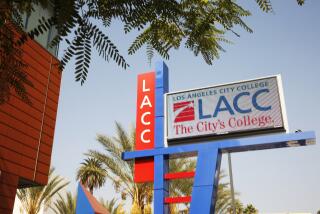Venture Capital Investor Is High on Education : Finance: Alan Patricof expects companies that teach children for a profit to make money.
- Share via
NEW YORK — Alan Patricof thinks a good way to make money in the ‘90s is to invest in companies that educate the nation’s schoolchildren for a profit.
The venture capitalist, whose Patricof & Co. has invested profitably in several businesses, including Apple Computer Inc. and Sunglass Hut International, said he tries to identify key moments of change and then invest accordingly.
Such a moment--he calls them “inflection points”--is occurring now in education, Patricof told the Bloomberg Forum.
“The education market will open opportunities in the 1990s,” Patricof said.
“The advent of interactive communications has created an inflection point where it’s economical to provide education differently than in the past. We’ve done education nonprofit through our history, and maybe the profit motive will be helpful,” he said.
Patricof said he didn’t have a specific investment in mind but said Whittle Communication’s Edison Project, a business that charges school boards to educate children, is “interesting.”
Patricof also likes businesses in the communications and biotechnology industries, though he said he has lost lots of money investing in biotechnology companies in the past.
Patricof & Co., which manages about $1.8 billion in assets, receives about 1,300 proposals a year asking for investment capital and invests in about 10. The company raises money from institutional investors, pension funds and big companies, such as AT&T; Corp. and Nynex Corp.
Its most recent fund, called APA Excelsior IV, raised about $265 million and made its first investment, for $5.6 million, in Heartland Automotive Services Inc., the single largest Jiffy Lube franchise in the United States. Jiffy Lube is the nation’s largest operator of express oil-change outlets for cars.
Once they commit their money, Patricof’s investors can’t change their minds--his investment partnerships last for 10 years.
“They’re committed for 10 years. They can’t change their minds in the middle,” Patricof said of his investors. “And returns are rarely the only thing they’re looking for. They’re looking for continuity.”
To be sure, Patricof’s returns are excellent. The fund which preceded Excelsior IV, known as Excelsior III, had a 34% rate of return, net of his company’s fees.
“We shoot for about 17%, that’s what AT&T; wants from their alternative investment area,” he said. “If we achieve that consistently we’d attract a lot of money.”
Patricof said his business differs from other venture capitalists because he’s more willing to invest in areas that scare others off.
“We’ll do international, we’ll do retailing, we’ll do start-ups or we’ll get in later,” he said. “We’re eclectic and have a lot of opportunities.”
More to Read
Inside the business of entertainment
The Wide Shot brings you news, analysis and insights on everything from streaming wars to production — and what it all means for the future.
You may occasionally receive promotional content from the Los Angeles Times.








